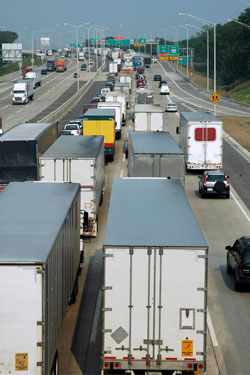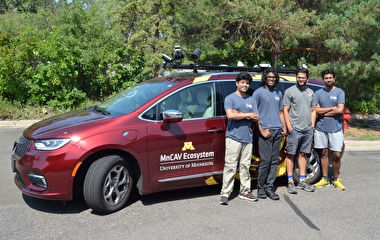Cybersecurity has become a key concern for the freight and logistics industry in our increasingly connected and automated world. A significant challenge is balancing information privacy and security with the industry’s need for usable, reliable data to produce expected benefits.
“You are more likely to experience a data breach of at least 10,000 records than you are to catch the flu this winter,” said Leo Janus, senior offering manager with IBM Watson Supply Chain. “Statistically, it’s becoming a very real thing, especially in logistics and supply chain.”
As the featured speaker at the 2018 Freight and Logistics Symposium, Janus highlighted the use of new technology to build trust across supply-chain networks for improved transparency, efficiency, and security.
Artificial intelligence (AI), which literally learns from data inputs, is one such technology. It ingests vast amounts of data, reasons over it, learns from interactions with that data, and then tries to mimic human interactions, Janus said. When it comes to cybersecurity, AI can analyze data networks and detect anomalies, helping organizations to better understand attacks and outthink attackers.
Another tool—blockchain—offers a private platform that encourages trust among multiple partners to share information and complete transactions. In 2018, Maersk and IBM collaborated to conceive TradeLens to apply blockchain to the world’s global supply chain. More than 90 organizations are participating in the platform, which allows partners to collaborate by establishing a single shared view of a transaction without compromising details, privacy, or confidentiality.
In addition to technology, standards and best practices can help ensure organizations are able to combat cyberattacks. The value of open collaboration between government and industry also can’t be overstated, Janus said. “We need to learn, and we need to coordinate, because the cyberattackers are coordinated.”
Following Janus, a panel of national experts further explored how the freight industry can make its data systems and processes more secure from increasing threats. Panelists highlighted the need to focus on prevention, transparency, communication and coordination, and the incorporation of security strategies into an organization’s business model.
Addressing third-party risk is an especially critical issue, according to Mike Johnson, an expert in security technologies with the U of M’s Technological Leadership Institute.
“You’ve got vendors that are connected that have your data, and you can expect that 60 percent of the breaches that could occur...will come from those sources,” he said.
At C.H. Robinson, vendors complete a robust security questionnaire as part of an evaluation process. “Security is not just technology,” said technology director Brett Cooksey. “It’s people, processes, and technology.”
Jay Hietpas, executive director of the MnDOT CAV-X office, and Josh Root, MnDOT senior legal counsel and data practices compliance official, concluded the symposium with presentations focused on cybersecurity and data privacy considerations for connected and automated vehicles (CAVs).
Potential improvements in safety, efficiency, and freight flow make it critical for Minnesota to invest in CAV development, including tackling the complex cybersecurity issues that come with progress.
“We are competing in a worldwide global market,” Hietpas said. “If Minnesota doesn’t come prepared, we’re going to be at a disadvantage compared to other countries and other states that are actually enabling these technologies and using them for the benefit of their businesses.”
“Early-adopting states are going to win this race,” Root said. “If we aren’t going to lead, we’re going to end up following. Let’s get ourselves in a position where we can be part of that formulating group.”
The symposium was sponsored by CTS in cooperation with MnDOT, the Minnesota Freight Advisory Committee, the Council of Supply Chain Management Professionals, the Metropolitan Council, and the Transportation Club of Minneapolis and St. Paul.




